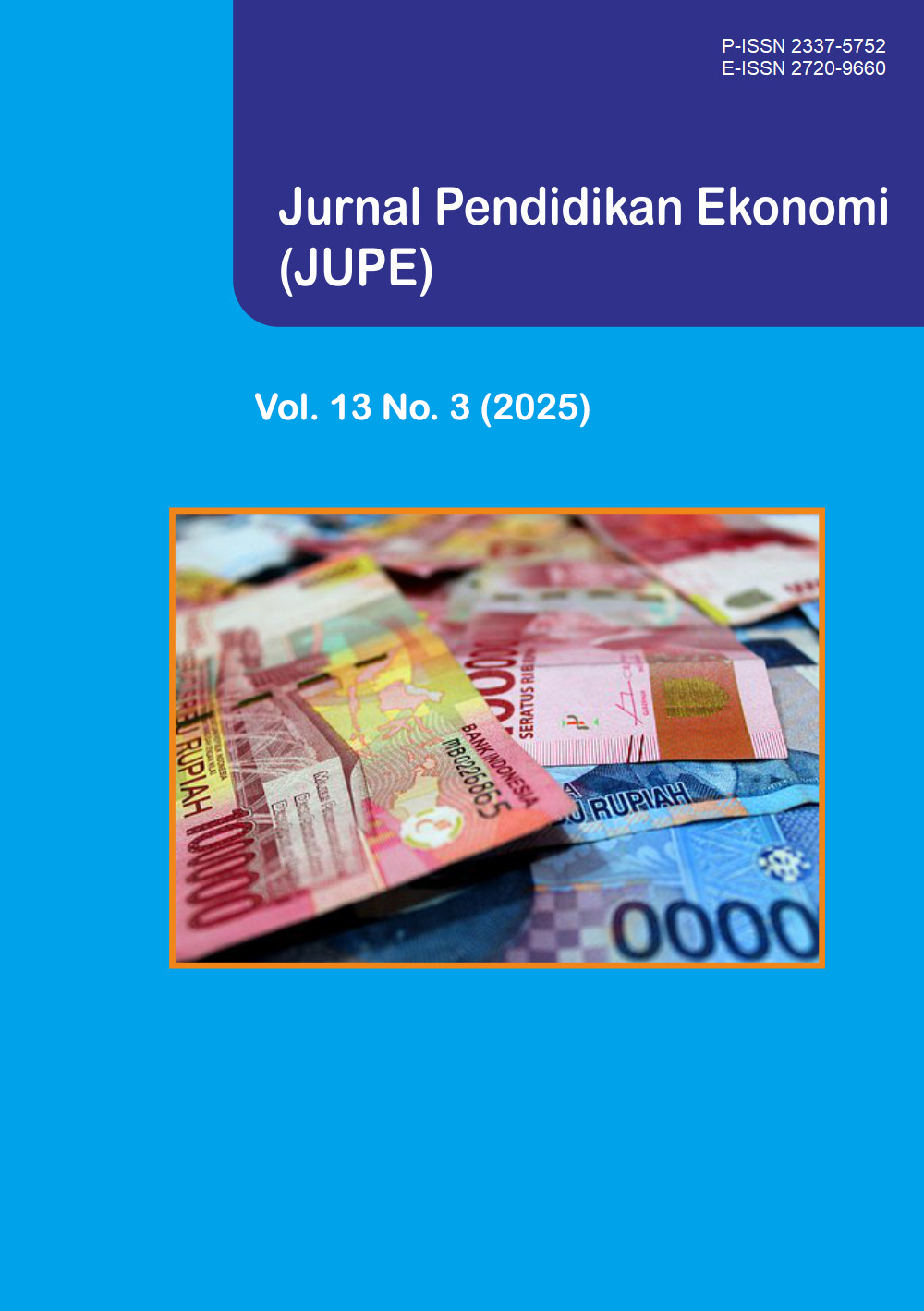Menggali makna kewirausahaan dalam pendidikan akuntansi: Perspektif mahasiswa AM terhadap kurikulum MBKM dan SDG 8
DOI:
https://doi.org/10.26740/jupe.v13n3.p303-314Keywords:
Accounting Education, entrepreneurship education, MBKM Curriculum, SDG8Abstract
The digital transformation and the requirements of SDG 8 have necessitated the incorporation of entrepreneurship into higher education, particularly in accounting education. The MBKM program is a strategic initiative aimed at enhancing experiential learning; nevertheless, research investigating student experiences in this setting is still few. A qualitative phenomenological approach indicates that student participation in the AM program enhances awareness and interest in entrepreneurial professions, especially as edupreneurs. Field activities improve interpersonal skills, including communication, collaboration, and leadership. Students believe that the incorporation of entrepreneurship into the curriculum is not comprehensive, hindered by insufficient infrastructure support, a scarcity of lecturer role models, and a rigid academic culture. This study underscores the significance of a transformational and interdisciplinary methodology in accounting education to cultivate an adaptive entrepreneurial ecosystem. Practical implications urge higher education institutions to enhance assistance for the cultivation of entrepreneurial competencies to facilitate the attainment of SDG 8.
Downloads
References
Abdul Kadar, N. S., Wan Yadri, W. S., Faris, N. D., Mohd Johari, M. D., Nurgeldiyevna, K. N., & Rahmat, N. H. (2023). Exploring Online Group Work Through The Social Cognitive Theory. International Journal of Academic Research in Business and Social Sciences, 13(9), 1584–1598. https://doi.org/10.6007/ijarbss/v13-i9/17744
Azhari, T. N. V., & Budiyanto, S. M. (2024). Pengaruh Dukungan Orang Tua, Motivasi, dan Pendidikan Kewirausahaan Terhadap Minat Berwirausaha pada Mahasiswa Pendidikan Akuntansi. Didaktika: Jurnal Kependidikan, 13(2), 2377–2388. Retrieved from https://jurnaldidaktika.org
Badan Pusat Satistik Indonesia. (2023). Statistik Indonesia 2023. Jakarta.
Bagus, H., Ramadhan, W., & Umamah, N. (2024). Application of Constructivist and Experiential Learning Theory in Social Studies Learning: Theoretical and Practical Perspectives. International Journal of Academic Pedagogical Research, 8(12), 71–76. Retrieved from www.ijeais.org/ijapr
Bauman, A., & Lucy, C. (2021). Enhancing Entrepreneurial Education: Developing Competencies for Success. International Journal of Management Education, 19(1), 1–10. https://doi.org/10.1016/j.ijme.2019.03.005
Bruksle, I., Chwallek, C., & Krastina, A. (2023). Strengthening Sustainability in Entrepreneurship Education -Implications for Shifting Entrepreneurial Thinking Towards Sustainability at Universities. ACTA PROSPERITATIS, 14(1). https://doi.org/10.37804/1691-6077-2023-14-37-48
Cahyani, S. D., Indrawati, S., & Subarno, A. (2023). Pengaruh MBKM-Kewirausahaan dan Penggunaan Media Sosial Terhadap Minat Berwirausaha Mahasiswa. Jurnal Publikasi Ilmu Manajemen (JUPIMAN), 2(3), 18–28. https://doi.org/10.55606/jupiman.v2i2.2023
Chani, S. P., & Satyawan, M. D. (2024). Pengaruh Mata Kuliah Akuntansi dan Kewirausahaan Terhadap Keputusan Berwirausaha Di Bidang Akuntansi. Jurnal Bisnis Dan Akuntansi Unsurya, 10(2), 99–109. https://doi.org/10.35968/jbau
Chankseliani, M., & McCowan, T. (2021). Higher Education and the Sustainable Development Goals. Higher Education, Vol. 81, pp. 1–8. Springer Science and Business Media B.V. https://doi.org/10.1007/s10734-020-00652-w
Creswell, J. W., & Creswell, J. D. (2018). Research and Design Qualitative, Quantitative and Mixed Methods Approaches. In SAGE Publications, Inc. California: Thousand Oaks California.
Creswell, J. W., & Poth, C. N. (2018). Qualitative Inquiry & Research Design: Choosing Among Five Approach (4th ed.). California: SAGE Publications, Inc.
Dinning, T. (2015). Dispelling the Myth of How to Develop Enterprise/Entrepreneurship Skills in University Students: A Staff Perception Study. Creative Education, 06(14), 1584–1596. https://doi.org/10.4236/ce.2015.614159
Direktorat Jenderal Pendidikan Tinggi Kementrian Pendidikan dan Kebudayaan. (2020). Buku Panduan Merdeka Belajar-Kampus Merdeka. Retrieved from https://dikti.kemdikbud.go.id/wp-content/uploads/2020/05/Buku-Panduan-Merdeka-Belajar-Kampus-Merdeka-2020-1.pdf
Dyantyi, N., & Faleni, N. (2023). Entrepreneurship Education to Stimulate Entrepreneurial Mindset in Chemistry Students. International Journal of Research in Business and Social Science (2147- 4478), 12(10), 209–216. https://doi.org/10.20525/ijrbs.v12i10.3110
Fathiyannida, S., & Erawati, T. (2021). The Effect of Entrepreneurial Education, Enterprise Motivation, Family Environment and Income Expectation on Accounting Students (Case Study on Active Students and Alumni of Accounting Program Faculty of Economics, Sarjanawiyata University Tamansiswa). Jurnal Ilmiah Akuntansi Dan Finansial Indonesia, 4(2), 83–94.
Fayolle, A., & Gailly, B. (2015). The Impact of Entrepreneurship Education on Entrepreneurial Attitudes and Intention: Hysteresis and Persistence. Journal of Small Business Management, 53(1), 75–93. https://doi.org/10.1111/jsbm.12065
García-Cabrera, A. M., Martín-Santana, J. D., Déniz-Déniz, M. de la C., Suárez-Ortega, S. M., García-Soto, M. G., & Melián-Alzola, L. (2023). The Relevance of Entrepreneurial Competences from a Faculty and Students’ Perspective: The Role of Consensus for the Achievement of Competences. International Journal of Management Education, 21(2), 1–18. https://doi.org/10.1016/j.ijme.2023.100774
Harahap, E. F. (2022). Peran Pembelajaran Akuntansi Terhadap Minat Wirausaha Mahasiswa Learning Manajemen System Sebagai Variabel Moderating. Jurnal Algoritma, 297–304. Retrieved from https://jurnal.itg.ac.id/
Igbinenikaro, O. P., Adekoya, O. O., & Etukudoh, E. A. (2024). Fostering Cross-Disciplinary Collaboration in Offshore Projects: Strategies and Best Practices. International Journal of Management & Entrepreneurship Research, 6(4), 1176–1189. https://doi.org/10.51594/ijmer.v6i4.1006
Ilmiani, A. M., Wahdah, N., & Mubarak, M. R. (2021). The Application of Albert Bandura’s Social Cognitive Theory: A Process in Learning Speaking Skill. Ta’lim al-’Arabiyyah: Jurnal Pendidikan Bahasa Arab & Kebahasaaraban, 5(2), 180–192. https://doi.org/10.15575/jpba.v5i2.12945
Ip, K. (2024). The Rise of EdTech: Transforming Education through Entrepreneurial Ventures. Advances in Online Education: A Peer-Reviewed Journal, 3(2), 177–193. https://doi.org/10.69554/nsvd4541
Jaya, I. M. L. M., & Bhuana, K. W. (2024). Depth Interviews of Accounting and Artificial Intelegance: Sustainability of Accountant In Indonesia. Quality - Access to Success, 25(200), 1–9. https://doi.org/10.47750/QAS/25.200.01
Karmini, N. W., S., M. N., Nugrahanti, T. P., Ramadhan, I., Rusliandy, R., & Sukomardojo, T. (2023). Hybrid Learning: Strategies to Attract Student Learning Interests and Outcomes on Post Pandemic. AL-ISHLAH: Jurnal Pendidikan, 15(2), 2275–2283. https://doi.org/10.35445/alishlah.v15i2.3460
Kolb, D. A. (1984). Experiential Learning: Experience As The Source of Learning and Development. In Prentice Hall, Inc. New Jersey: Prentice Hall, Inc. https://doi.org/10.1016/B978-0-7506-7223-8.50017-4
Kuratko, D. F. (2017). Corporate Entrepreneurship 2.0: Research Development and Future Directions. Foundations and Trends in Entrepreneurship, 1(3), 187–192. https://doi.org/10.61100/adman.v1i3.78
Mahmoud, A., & Nagy, Z. K. (2009). Applying Kolb’s Experiential Learning Cycle for Laboratory Education. Journal of Engineering Education, 98(3), 283–294. https://doi.org/10.1002/j.2168-9830.2009.tb01025.x
Mahmudin, T. (2023). The Importance of Entrepreneurship Education in Preparing the Young Generation to Face Global Economic Challenges. Journal of Contemporary Administration and Management (ADMAN), 1(3), 187–192. https://doi.org/10.61100/adman.v1i3.78
Mahome, M. M., Mphahlele, L. K., & Malatji, K. S. (2024). The Role of Teacher Trade Unions in Preventing Staff Victimisation: Voices from the South African Teachers. E-Journal of Humanities, Arts and Social Sciences, 5(1), 26–37. https://doi.org/10.38159/ehass.2024513
Marin, A., Boanță, L. F., Țelinoiu, A., Darie, G., & Din, M. A. (2018). Supporting Entrepreneurship and Innovation in Higher Education in Romania. Proceedings of ICERI2018 Conference, 1, 9938–9947. Seville. https://doi.org/10.21125/iceri.2018.0844
Mcleod, S. (2013). Kolb ¬ Learning Styles The Experiential Learning Cycle. Simply Psychology, 1–11.
Melsa, F., Wahyuni, S., & Asmah, S. (2022). Pembelajaran Kewirausahaan dan Merdeka Belajar Kampus Merdeka (MBKM): Studi Kasus di Program Studi Pendidikan Biologi. PUSTAKA: Jurnal Bahasa Dan Pendidikan, 2(3), 126–136.
Muharam, A., Mawardi, C. M., & Sari, A. F. K. (2025). Pengaruh Pendidikan Kewirausahaan dan Keterampilan Terhadap Motivasi Berwirausaha (Studi Empiris Pada Mahasiswa Akuntansi 2020 di Universitas Islam Malang). E_Jurnal Ilmiah Riset Akuntansi, 14(01), 884–896. Retrieved from http://jim.unisma.ac.id/index.php/jra,
Nabi, G., Liñán, F., Fayolle, A., Krueger, N., & Walmsley, A. (2017). The Impact of Entrepreneurship Education in Higher Education: A Systematic Review and Research Agenda. Academy of Management Learning and Education, 16(2), 277–299. https://doi.org/10.5465/amle.2015.0026
Nur Laili, A. N., Muhartono, D. S., Prangdicha, B., & Anggaini, V. K. (2025). The Role of The Independent Curriculum in Improving the Quality of Students to Move Towards A Golden Indonesia 2045. Irpia : Jurnal Ilmiah Riset Dan Pengembangan, 10(1), 28–33. https://doi.org/10.71040/irpia.v10i8.278
Pacheco, M. A. de la P., Torres, J., Padron, J. C. C., Barros, M. C. P., & Rico, H. (2025). Analyzing the Role of Gender in Entrepreneurship Education and Economic Success in Developing Nations: the Case of Colombia. Cogent Economics and Finance, 13(1), 1–18. https://doi.org/10.1080/23322039.2025.2457476
Passavanti, C., Ponsiglione, C., Primario, S., & Rippa, P. (2023). The Evolution of Student Entrepreneurship: State of the Art and Emerging Research Direction. International Journal of Management Education, 21(2), 1–17. https://doi.org/10.1016/j.ijme.2023.100820
Passavanti, C., Primario, S., & Rippa, P. (2024). How Entrepreneurial Role Models Impact on Entrepreneurial Outcomes: A Gender Perspective. International Journal of Management Education, 22(3), 1–13. https://doi.org/10.1016/j.ijme.2024.101011
Patricia. (2024). The Role of Entrepreneurship Education in Universities to Pursue Sustainable Development Goals. Feedforward: Journal of Human Resource, 4(1), 23–40. Retrieved from https://sdgs.un.org/goals/goal2
Prasetia, J., & Aisyah, S. (2024). Determinan Pengangguran Terdidik di Pulau Jawa. INNOVATIVE: Journal of Social Science Research, 4(2), 5761–5770.
Prastyaningtyas, E. W., Sutrisno, S., Soeprajitno, E. D., Ausat, A. M. A., Ausat, A. M. A., & Suherlan, S. (2023). Analysing the Role of Mentors in Entrepreneurship Education: Effective Support and Assistance. Journal on Education, 5(4), 14571–14577. https://doi.org/10.31004/joe.v5i4.2511
Putri Annisa, A. F. R. Z. (2022). The Effect of The Outbound Method on Children’s Skills and Dexterity. International Journal of Students Education, 1(2), 230–232.
Rambe, P., & Ndofirepi, T. M. (2019). Explaining Social Entrepreneurial Intentions among College Students in Zimbabwe. Journal of Social Entrepreneurship, 12(2), 1–22. https://doi.org/10.1080/19420676.2019.1683878
Reimers, F. M. (2024). Entrepreneurship Education to Improve the world: The Role of the Sustainable Development Goals to Stimulate Innovation in Higher Education. Entrepreneurship Education, 7(3), 203–217. https://doi.org/10.1007/s41959-024-00127-4
Reyad, S. M. R., Musleh Al-Sartawi, A., Badawi, S., & Hamdan, A. (2019). Do Entrepreneurial Skills Affect Entrepreneurship Attitudes in Accounting Education? Higher Education, Skills and Work-Based Learning, 9(4), 739–757. https://doi.org/10.1108/HESWBL-01-2019-0013
Riani, A. R., & Haryatiningsih, R. (2023). Analisis Faktor yang Mempengaruhi Pengangguran Terdidik Kota Besar di Pulau Jawa. Jurnal Riset Ilmu Ekonomi Dan Bisnis, 3(2), 125–132. https://doi.org/10.29313/jrieb.v3i2.2821
Saputri, A. R., & Kholid, M. N. (2021). Wirausaha Sebagai Preferensi Karir Mahasiswa Akuntansi: Penjelasan Model Terintegrasi. Akurasi: Jurnal Studi Akuntansi Dan Keuangan, 4(2), 227–244.
Saraswati, E., Erel, R. A., & Anjani, A. (2021). Roles of Accountants and Sustainable Development Goals in Indonesian Crude Palm Oil Industry. Global Business and Management Research: An International Journal, 13(4s), 575–586.
Shilfani, S., & Limbongan, M. E. (2022). Needs Analysis of Edupreneurship Learning in the English Language Education Study Program. Ethical Lingua: Journal of Language Teaching and Literature, 9(2), 793–801. https://doi.org/10.30605/25409190.450
Sun, P., Ma, K., Xu, X., & Yan, L. (2025). How Self-Efficacy Shapes Professional Identity: The Mediating Role of Meaning in Life and Self-Esteem in Pre-Service Physical Education Teachers. BMC Psychology, 13(387), 1–13. https://doi.org/10.1186/s40359-025-02679-z
Tonna, M. A., Bjerkholt, E., & Holland, E. (2017). Teacher Mentoring and the Reflective Practitioner Approach. International Journal of Mentoring and Coaching in Education, 6(3), 210–227. https://doi.org/10.1108/IJMCE-04-2017-0032
UNESA. (2023). Laporan Tracer Study Program Studi S1 Akuntansi. Retrieved from https://statik.unesa.ac.id/akuntansi/file/363b7e9a-dccd-4c01-ac5f-973831b05291.pdf
Wright, M., Siegel, D. S., & Mustar, P. (2017). An Emerging Ecosystem for Student Start-ups. Journal of Technology Transfer, 42(4), 909–922. https://doi.org/10.1007/s10961-017-9558-z
Yolanda, N., Kristyan Yuniardi, A., & Dewi Hendaryati, D. (2023). Niat Kewirausahaan Berkelanjutan di Kalangan Mahasiswa: Sebuah Studi Konseptual. Labs: Jurnal Bisnis Dan Manajemen, 28(4), 24–30.
Zahrotul, Z., 1, F., Kamil, N., Kamil, N., Rahmatun, H., 4, N., & Munastiwi, E. (2023). Edupraneurship in Fostering Entrepreneurial Values in Early Childhood. 7(2), 241–250. Retrieved from http://journal.iaialhikmahtuban.ac.id/index.php/ijecie
Downloads
Published
How to Cite
Issue
Section
License
Copyright (c) 2025 Umi Nuraini, Sulikah Sulikah (Author)

This work is licensed under a Creative Commons Attribution-NonCommercial 4.0 International License.
Copyright
- Authors retain copyright and grant the journal right of first publication with the work simultaneously licensed under a Creative Commons Attribution License that allows others to share the work with an acknowledgment of the work's authorship and initial publication in this journal.
 Abstract views: 97
,
Abstract views: 97
, PDF Downloads: 92
PDF Downloads: 92











